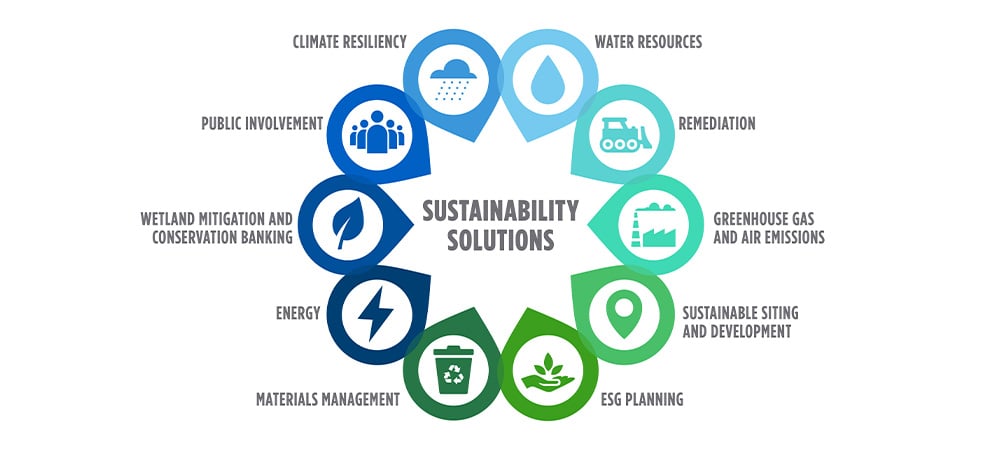Service Feature
Sustainability Practices Provide Future-Focused Solutions
Environmental, social and governance (ESG) criteria and transparency of these criteria are driving significant regulatory change and influencing business and investment decisions in all sectors and industries, from local governments and manufacturers to transportation and utilities.

Identifying and critically evaluating opportunities to apply concepts in efficient, cost-effective ways is crucial for developing sustainable solutions. Our team has the experience and capability to take your sustainability solution from start to finish. Delivering resilient implementation plans and executing projects that validate a commitment to sustainability can help organizations track and meet environmental, social and governance (ESG) goals.
Sustainability goes beyond pure air, clean water and minimal waste. For organizations to accomplish their sustainability goals, a holistic and systems-thinking approach is necessary for success. Strategies for developing sustainable solutions can take a number of different forms:

- Climate impacts and resiliency. Preparing for climate change and the resulting cleanup after a natural disaster is crucial. Climate resilience can be built through: forecasting flood plain and sea level changes; meteorology and modeling; land, forestry management and master planning; water availability studies and reuse evaluations; groundwater modeling and restoration; and vegetation replanting.
- Ecological protection and restoration. Navigating regulatory compliance for federal, state and local regulations can be tricky. It’s important to develop project-specific environmental strategies to minimize and mitigate environmental impacts. Teams can design, build and monitor ecological restoration sites, wetland mitigation projects and species-specific conservation initiatives.
- Energy. Investing in energy diversification and storage projects can help provide reliable power that meets sustainability goals. Energy diversification opportunities include solar, wind, hydro, biomass, biofuels, biochemicals, renewable natural gas, electrification, hydrogen and ammonia. In emerging markets such as transportation electrification, it’s key to work with utilities, transit agencies and fleet operators to find realistic, sustainable and actionable solutions based on data. Sequestering carbon dioxide from traditional energy sources is an additional solution.
- Greenhouse gas and air emissions. Conducting greenhouse gas (GHG) and criteria pollutant emissions tests and preparing reduction strategies can help contribute to a net zero future. By identifying reports for industry compliance and sustainability frameworks, clients can evaluate Scope 1, 2, and 3 GHG emissions. Effective sustainability efforts may involve permitting, emissions control and regulatory evaluations, modeling for impacts to sensitive populations, environmental justice analyses, and predictions of emissions for offsets as part of implementing successful net zero plans.
- Materials management. From materials processing to development of zero waste plans, these strategies aid in the goals of the recycling industry to minimize waste. Solid waste and materials management plans, recyclable materials sourcing and procurement of materials recovery services all go into the process of recycling. Characterizing waste helps to determine materials processing, composting and recycling program design.
- Remediation. Optimizing remediation programs using management practices (BMPs) helps to make judicious use of limited resources. Taking a holistic approach involves considering sustainability early in the planning process to incorporate those BMPs into all phases, from site investigation through remedy selection, construction and operation of treatment systems through closeout.
- Stakeholder involvement. Successful stakeholder engagement is essential to achieving sustainability goals, whether for a first ESG report or a strategic plan in place for a decade. Engaging stakeholders through multiple channels — including public outreach, community engagement, media relations and strategic communications — keeps the lines of communication open.
- Sustainability and ESG planning. Goal setting and tracking is the foundation for identifying, prioritizing and implementing sustainability initiatives. Services include: sustainability orientation and workforce education; current and future state analyses; gap analyses; reporting framework selection; environmental performance improvement strategies; and project development for carbon reductions and credits.
- Sustainable siting and development. Studies and supporting documentation often are crucial to gaining project approvals from federal, state and local authorities, and from utility regulators. Environmental impact statements (EIS), environmental assessments (EAs) and route selection studies are often early steps toward project construction. Careful site selection and development can minimize environmental impacts and create opportunities for sustainable operations. A traditional scope of sustainable siting and development services includes: renewable siting projects, battery storage projects, brownfield development and construction permitting.
- Water resources. Finding water supply, management and treatment solutions helps address sustainability concerns. Having a thorough knowledge of engineering and environmental compliance is needed to have well-designed and well-constructed wetland treatment systems, stormwater management networks and industrial and municipal water recycling and reuse facilities.
✖